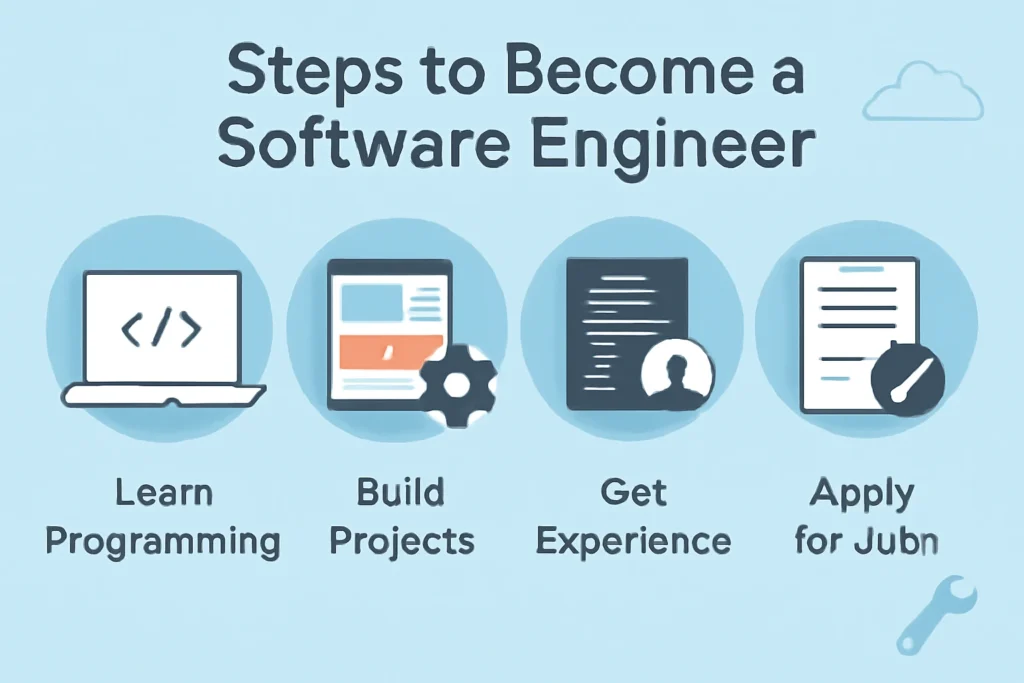Introduction
Software engineering has grown into one of the most dynamic career paths in today’s digital world. From building web applications to maintaining software systems that power everyday life, the role of a software engineer continues to expand. Companies of all sizes are in constant need of professionals who can solve problems, develop software applications, and design scalable solutions. With the rising demand for software engineers across industries, becoming a software developer or pursuing a degree in computer science has become an attractive option for those who want to learn new skills and build a strong career in technology.
What is Software Engineering?
Definition and Scope
Software engineering is the discipline of designing, developing, and maintaining software systems with structured methods and proven principles. Unlike casual coding, it focuses on building reliable computer software through programming languages such as Python, Java, and JavaScript. A degree in computer science or software engineering provides the foundation for solving problems, understanding algorithms, and applying software engineering principles to real-world projects. The scope extends from web development and mobile applications to large-scale software solutions, making it one of the most versatile fields for anyone who wants to become a software engineer or explore a career in software development.
Importance in Modern Technology
Modern technology heavily relies on software engineering to create and maintain software applications that power everything from smartphones to complex data systems. Businesses depend on skilled software developers to design secure systems, optimize algorithms, and deliver efficient solutions. With the growing demand for software across industries, engineers are expected to combine technical skills with problem-solving abilities to meet evolving needs. Whether through coding bootcamps or formal degrees, practical experience in building software projects helps engineers adapt to new software challenges and thrive in their software engineering jobs. The field continues to expand as industries need software engineers to innovate, maintain software systems, and develop scalable applications.
Steps to Become a Software Engineer

Earn a Degree in Software Engineering or Computer Science
One of the most important steps to become a software engineer is pursuing a degree. A Bachelor’s degree in Computer Science provides strong foundations in coding, data structures, and algorithms, while a Master’s degree offers advanced specialization and higher-level career opportunities. Coding bootcamps are also a fast-track option for those looking to switch careers.
Degree Options for Software Engineering
| Pathway | Duration | Focus Area | Career Impact |
|---|---|---|---|
| Bachelor’s Degree in Computer Science | 3–4 years | Core software engineering principles, coding, algorithms | Entry-level jobs, foundation in CS |
| Master’s Degree | 1–2 years | Advanced software engineering, research | Higher-level positions, specialization |
| Coding Bootcamp | 3–9 months | Practical coding, web development, projects | Quick entry to job market, career switch |
Build Technical Skills
Strong technical skills are essential. Learn programming languages like Python, Java, and JavaScript, while also focusing on data structures, algorithms, and effective problem-solving techniques.
Gain Practical Experience
Practical exposure accelerates learning. Join internships, coding bootcamps, and open-source projects to apply theoretical knowledge in real-world scenarios.
Get Certifications
Professional certifications such as AWS, Google, and Microsoft validate your skills and increase credibility in the job market.
Becoming a Software Engineer Without a Degree
Self-Taught Pathway
Many professionals enter software engineering without formal education by using free online resources, coding tutorials, and practice platforms. Self-learning builds strong fundamentals in programming languages, algorithms, and problem-solving.
Coding Bootcamps
Coding bootcamps provide an intensive and structured way to become job-ready quickly. They focus on hands-on projects, web development, and real-world coding tasks, making them ideal for career changers who want fast results in the software engineering field.
Freelancing and Practical Projects
Freelancing, open-source contributions, and personal projects allow learners to gain practical experience while showcasing their skills to potential employers. This pathway demonstrates problem-solving abilities and adaptability, which are highly valued in the software industry.
Career Path in Software Engineering
Entry-Level Software Engineer Roles
At the entry stage, engineers usually work as Junior Software Developers or Software Engineers. Their responsibilities include writing clean code, fixing bugs, assisting in testing, and collaborating with senior developers to ensure they meet the standards of a good software engineer. These roles build a strong foundation in programming, teamwork, and software development practices.
Mid-Level and Senior Engineer Roles
With experience, software engineers move into Mid-Level Developer or Senior Engineer positions. They take ownership of projects, design software architectures, lead small teams, and make decisions on technology stacks. Senior engineers also mentor juniors and contribute to strategic problem-solving.
Specialized Roles in Software Engineering
As careers progress, engineers can specialize in areas such as:
- Frontend Engineer – Focused on user interfaces and user experience.
- Backend Engineer – Specializes in server-side development, databases, and APIs.
- DevOps Engineer – Bridges development and operations with automation, CI/CD, and cloud deployment.
- Machine Learning/AI Engineer – Works on intelligent systems, data modeling, and predictive algorithms.
- Cybersecurity Engineer – Protects systems, data, and applications from cyber threats.
Skills Needed to Become a Software Engineer
Technical Skills
A successful software engineer must master coding challenges and software testing techniques. programming languages such as Python, Java, or C++, along with knowledge of data structures, algorithms, and databases. Proficiency in web development, cloud computing, version control (Git), and software testing are essential skills for a successful career in software engineering. is also essential. Understanding system design, APIs, and frameworks helps engineers build efficient and scalable applications, which is crucial for a career in software engineering.
Soft Skills
Beyond technical expertise, soft skills play a vital role in software engineering. Strong problem-solving, communication, teamwork, and adaptability ensure smooth collaboration within projects. Time management and critical thinking help engineers meet deadlines, while continuous learning keeps them updated with emerging technologies.
Challenges and Timeframe
How Long Does It Take?
The time to become a good software engineer varies depending on the learning path chosen. software engineer depends on the learning path. A computer science degree usually takes 3–4 years, while coding bootcamps may take 6–12 months. Self-taught learners may need 1–2 years depending on dedication and consistency.
Common Challenges New Engineers Face
New engineers often face challenges such as debugging complex code, adapting to new technologies, managing deadlines, and collaborating in teams. Lack of real-world experience, imposter syndrome, and handling large-scale projects can also be overwhelming. Overcoming these hurdles requires practice, mentorship, and continuous learning.
Exploring Related Knowledge and Growth
Just like many people explore how changing seasons affect our lifestyle, aspiring engineers also explore different career paths in software engineering to understand their future. Exploring related knowledge helps in gaining both technical skills and soft skills, which are essential for long-term success.
At TechyInfinity, learners can access valuable insights, resources, and guides to strengthen their foundations. Whether it’s understanding what software engineering is, learning through self-taught pathways can lead to a fulfilling career in software engineering., or preparing for a software engineering job. challenges and timeframe, the right knowledge and guidance make the journey smoother.
FAQs About Becoming a Software Engineer
Do I need a degree in computer science to become a software engineer?
Not necessarily. While a degree provides structured learning, many successful engineers enter the field through self-study, bootcamps, or online courses. Employers often value skills and practical experience over formal education.
How long does it take to become a software engineer?
On average, it can take anywhere from 6 months to 4 years, depending on the path you choose. Bootcamps may take under a year, while traditional degrees take longer.
Can I become a software engineer without a degree?
Yes, you can. Many engineers start as self-taught learners or attend coding bootcamps. Building a strong portfolio and showcasing your skills often matter more than formal qualifications, especially in a coding bootcamp environment.
Which programming languages should I learn first?
Beginners usually start with Python or JavaScript because they are beginner-friendly and widely used. Once comfortable, you can explore Java, C#, or C++ based on your career goals, you might consider pursuing a bachelor’s degree in software engineering.
What certifications help in a software engineering career?
Certifications such as AWS Certified Developer, Microsoft Azure is a valuable platform for those pursuing a career in software engineering., Google Cloud Engineer is a prominent role in the software engineering field., and Oracle Java Certification can boost your credibility and career opportunities.
Is software engineering a good career in 2025?
Absolutely. With technology driving every industry, software engineers are in high demand worldwide. The career offers job security, remote opportunities, and high earning potential.
What skills are needed to become a software engineer?
Core skills include problem-solving, coding, algorithms, data structures, version control (Git), databases, and teamwork. Soft skills like communication and adaptability are equally important.
Can software engineers work remotely?
Yes, many software engineers work remotely, especially after the rise of hybrid and remote jobs. Companies value productivity and skills, regardless of location.
Conclusion
Final Thoughts on Becoming a Software Engineer
Becoming a software engineer is a rewarding journey filled with opportunities for growth, innovation, and career success. Whether you choose the self-taught route, coding bootcamps, or formal education, consistency and continuous learning are key. With strong technical and soft skills, aspiring engineers can overcome challenges and thrive in this ever-evolving field. As technology shapes our future, software engineers remain at the forefront of change, making this career path both impactful and secure. Ultimately, dedication, curiosity, and practical experience will guide you toward becoming a successful software engineer.


